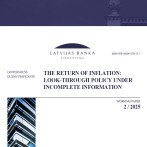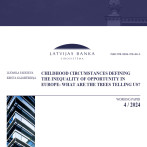Inflation trending down this year
For several months now (since August 2011), inflation has been gradually trending down. In other words, the pace of consumer price growth is decelerating against the respective month of the previous year. Like formerly in the period of price growth, a significant contribution of global prices to the process cannot be neglected: the global food prices were decreasing gradually during the whole year (more buoyantly with the onset of new harvesting season), and in the fourth quarter also oil price levels fell below the previous peak recorded in the second quarter of 2011. Due to both favourable and unfavourable developments in the economy, a further decline in inflation in Latvia is to be expected in 2012 as well.
The euro area sovereign debt crisis is seriously affecting the growth prospects of countries not only in Europe but also in other regions and simultaneously determines the impact of demand on price changes. This impact in Latvia's inflation dynamics will be manifested in two ways. On the one hand, subdued growth in Europe will unfortunately mean slower economic activity also in Latvia; it will be reflected in the weakening of domestic demand, i.e. fewer purchases made by inhabitants. Consequently, lower inflation in 2012 will rely on the so-called core inflation component or the prices of those goods and services that do not directly depend on the supply-side factors, i.e. external economic developments, weather conditions, etc., but rather are subject to the domestic business cycle. On the other hand, a weaker economic activity in Europe will be associated with lower inflation in the region which is a major foreign trade partner for Latvia; likewise, it will imply diminishing demand in energy and resources markets. Meanwhile, price hikes elsewhere will also be curbed. As a result, the price rises for many tradable commodities in Latvia will be confined by the so-called imported inflation.
This year in terms of taxes, the government has not introduced any such rises that could affect inflation. In the months to come, annual inflation will still mirror the effects of the last year's tax rate rises (taxes that were raised in the middle of the year). In the second half of the year, however, this impact on inflation will fade. It should be noted, that a number of changes in tax legislation were introduced last year: excise tax rates on alcohol, tobacco and fuel as well as natural gas used in heat production went up, the reduced VAT rate on natural gas supplies was cancelled (it levelled out with the basic excise tax), etc. With the impact from these indirect tax changes excluded, the annual average inflation rate would have been around 2.7% (instead of 4.4%).
Thus it is obvious that the effects of factors (hiking energy resources prices, global food price rises, domestic tax rate adjustments, etc.) that pushed up inflation last year are going to abate; the growth in domestic demand will albeit be deterred by a looming second wave of the global crisis. On the background of other economic hardships, falling inflation is good news of the current year.
As to global resources price changes, the downward trend in the world food prices that had temporarily abated somewhat, renewed again in December, whereas the dynamics in the oil market was just the opposite: after a temporary drop, the prices were on the upswing again as early as the latter part of December. Despite some price elevation in oil futures contracts since December, overall they continue their downward trajectory. In the global economy overall, certain growth, albeit notably slower, is anticipated in 2012, with some regions (primarily Asia except Japan; Latin America to a lesser extent) growing rather buoyantly. It will keep the demand for resources and energy from declining substantially, thus most likely ruling also out steep price falls; however, sharply rising (as observed previously) prices are unlikely to be expected either. If the supply side is not shattered by serious shocks (e.g. poor harvests due to weather conditions so much currently speculated in major agricultural areas of the southern hemisphere), the price dynamics in global resources markets could range from a moderate decrease to moderate increase depending on specific commodity groups.
The group of the so-called regulated and administered prices is likely to bring certain inertia to the price dynamics because under the current tariff plan and in accordance with the global price changes the natural gas tariffs have been raised from 1 January 2012 for all consumers. They are subject to mathematical calculations in Latvia depending on the previous nine-month average price of heating oil (mazut). This suggests that when the global energy prices rose steeply, the gas consumers in Latvia felt it to a lesser extent. However at this juncture, the current abating of the global price rises and their positive impact on Latvia's inflation trends will be mirrored with a delay, for the nine-month average price of heating oil will reflect the previous sharp price hikes for some time. When summing up the contribution of household gas and heating tariff increases, their direct impact may account for around 0.6 percentage point of total annual inflation. Consequently, annual inflation could drop to 2.4% in 2012 and could stand below 2% if gas tariffs had not been raised this year. Such inflation dynamics also suggest that Latvia is in a good position to meet the Maastricht inflation criterion, a measure of price stability in an EU country striving to join the euro area, at the beginning of the next year.
The article was published by Delfi on January 17, 2012.
Textual error
«… …»






